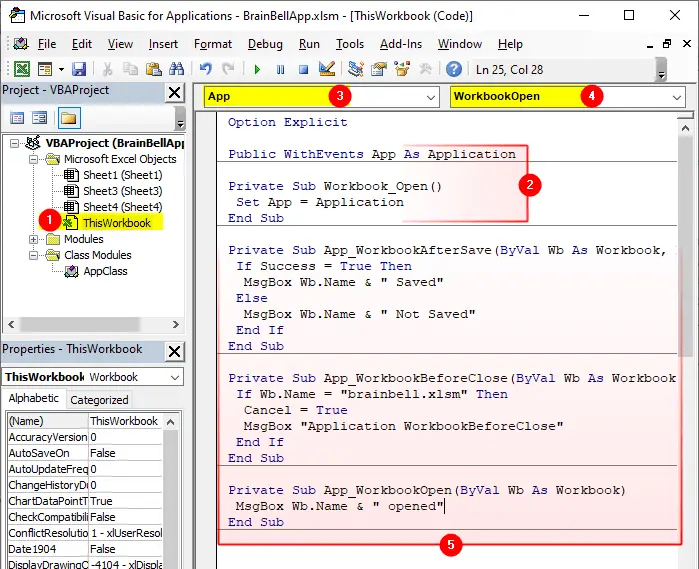Option Explicit Public WithEvents App As Application Private Sub Workbook_Open() Set App = Application End Sub

WorkbookAfterSave
Syntax: App_WorkbookAfterSave(Wb, Success)
The WorkbookAfterSave event occurs after any workbook is saved. The App_WorkbookAfterSave procedure has two arguments:
Wbis the saved workbookSuccessreturnsTrueif the save operation was successful; otherwise,False.
App_WorkbookAfterSave Example:
Option Explicit Public WithEvents App As Application Private Sub App_WorkbookAfterSave(ByVal Wb As Workbook, ByVal Success As Boolean) If Success = True Then MsgBox Wb.Name & " Saved" Else MsgBox Wb.Name & " Not Saved" End If End Sub Private Sub Workbook_Open() Set App = Application End Sub
The WorkbookAfterSave is an application-level event that affects all open workbooks in an Excel session. To work with a particular workbook use the Workbook_AfterSave procedure.
WorkbookBeforeSave
Syntax: App_WorkbookBeforeSave(Wb, SaveAsUI, Cancel)
The WorkbookBeforeSave event occurs before any workbook is saved. The App_WorkbookBeforeSave procedure accepts three arguments:
Wb
The workbookSaveAsUIreturn True if:- the file is not already saved and a
Save this filedialog box is displayed - the file is read-only and
Save Asdialog box is displayed - you clicked Save As button and
Save Asdialog box is displayed
- the file is not already saved and a
Cancel
Setting Cancel toTrueprevents the workbook from being saved.
App_WorkbookBeforeSave Example:
Option Explicit Public WithEvents App As Application Private Sub App_WorkbookBeforeSave(ByVal Wb As Workbook, ByVal SaveAsUI As Boolean, Cancel As Boolean) If SaveAsUI = True Then Cancel = True MsgBox "Save As not allowed" End If End Sub Private Sub Workbook_Open() Set App = Application End Sub
The WorkbookBeforeSave is an application-level event that affects all open workbooks in an Excel session. To work with a particular workbook use the Workbook_BeforeSave procedure.
WorkbookBeforeClose
Syntax: App_WorkbookBeforeClose(Wb, Cancel)
The WorkbookBeforeClose event occurs before any workbook is closed. The App_WorkbookBeforeClose procedure has two arguments:
Wb
The workbookCancel
Setting Cancel to True prevents the workbook from closing
App_WorkbookBeforeClose Example:
Option Explicit Public WithEvents App As Application Private Sub App_WorkbookBeforeClose(ByVal Wb As Workbook, Cancel As Boolean) If Wb.Name = "brainbell.xlsm" Then Cancel = True MsgBox "Application WorkbookBeforeClose" End If End Sub Private Sub Workbook_Open() Set App = Application End Sub
The WorkbookBeforeClose is an application-level event that affects all open workbooks in an Excel session. To work with a particular workbook use the Workbook_BeforeClose procedure.
WorkbookOpen
Syntax: App_WorkbookOpen(Wb)
The WorkbookOpen event occurs when any workbook is opened. The App_WorkbookOpen procedure uses one argument Wb which represents the opened workbook.
App_WorkbookOpen Example:
Option Explicit Public WithEvents App As Application Private Sub App_WorkbookOpen(ByVal Wb As Workbook) MsgBox Wb.Name & " opened" End Sub Private Sub Workbook_Open() Set App = Application End Sub
The WorkbookOpen is an application-level event that affects all open workbooks in an Excel session. To work with a particular workbook use the Workbook_Open procedure.